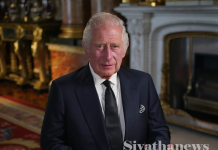A journalist killed by a dissident republican paramilitary in Northern Ireland is to be laid to rest on Wednesday at a ceremony celebrating her life to be attended by British Prime Minister Theresa May.
Lyra McKee, 29, who chronicled the troubled history of Northern Ireland, was shot in the head on Thursday as rioters clashed with police in Londonderry, the second city of the British province.
Dissident republican faction the New IRA claimed responsibility on Tuesday but apologised, saying the shots had been aimed at the police.
The killing evoked memories of the three decades of violent strife in Northern Ireland and sparked condemnation across the political spectrum also in the neighbouring Republic of Ireland.
Downing Street announced on Wednesday that May would attend the funeral, missing her weekly Prime Minister’s Questions in parliament.
McKee’s partner Sara Canning said her funeral at St Anne’s Cathedral in Belfast would be a “celebration of her life”.
McKee established her career writing about so-called “ceasefire babies” — the generation which came of age after the 1998 Good Friday Agreement which ended the conflict known as “The Troubles”.
She was also a passionate advocate for LGBT issues, and featured in the prestigious Forbes “30 under 30” list of rising stars in the media across Europe in 2016.

“Such a warm and innocent heart, she was the greatest listener, someone who had time for everyone,” her family said in a statement.
“She was a smart, strong-minded woman who believed in passionately in inclusivity, justice and truth.”
Fellow writer Susan McKay told BBC radio she was “the antithesis of everything the New IRA stand for”.
Canning asked that those attending the funeral ceremony wear Harry Potter and Marvel superhero clothing in tribute to McKee’s love of the franchises.
The funeral is expected to begin at around 1200 GMT, with the cathedral ceremony live streamed on television, before a private burial.
Irish Foreign Minister Simon Coveney is to attend the ceremony alongside President Michael D. Higgins.
Representatives from Northern Ireland’s six main political parties are also expected to attend, having issued a rare joint statement in condemnation of the killing.

“It was a pointless and futile act to destroy the progress made over the last 20 years, which has the overwhelming support of people everywhere,” the statement said.
Britain’s minister for Northern Ireland Karen Bradley called McKee a “young, vibrant woman who symbolised the new Northern Ireland”.
“Our lasting tribute to Lyra will be to ensure that we continue to work for peace for the whole of Northern Ireland,” she told MPs on Tuesday.
McKee’s family said it understood the anger over her murder, but urged people to respond with “positivity and hope”.
“Lyra’s answer would have been simple — the only way to overcome hatred and intolerance is with love, understanding and kindness,” they said.
The New IRA offered its “full and sincere apologies” for McKee’s death, saying she was unintentionally shot as their forces targeted police.
The splinter group seeks the integration of the British province of Northern Ireland with the Republic of Ireland — rejecting mainstream non-violent political campaigns to achieve that end.

The group has been condemned by republican leaders, with Sinn Fein head Mary Lou McDonald saying it was “tiny, unrepresentative group” that was “essentially at war now with their own community”.
“There’s no appetite whatsoever in Creggan (the area where McKee was killed), in Derry, anywhere across nationalist Ireland for a return to conflict,” she told BBC radio.
Police in Northern Ireland said Tuesday that a 57-year-old woman had been arrested under the Terrorism Act in connection with the killing.

Two men aged 18 and 19 who were arrested earlier in the investigation have now been released without charge.
McKee’s killing follows a spate of letter bombings and a car bombing, also claimed by the New IRA.
It has fuelled fears that the political turbulence over Brexit, which threatens new border checkpoints between Northern Ireland and the Republic of Ireland, may increase paramilitary activity.












